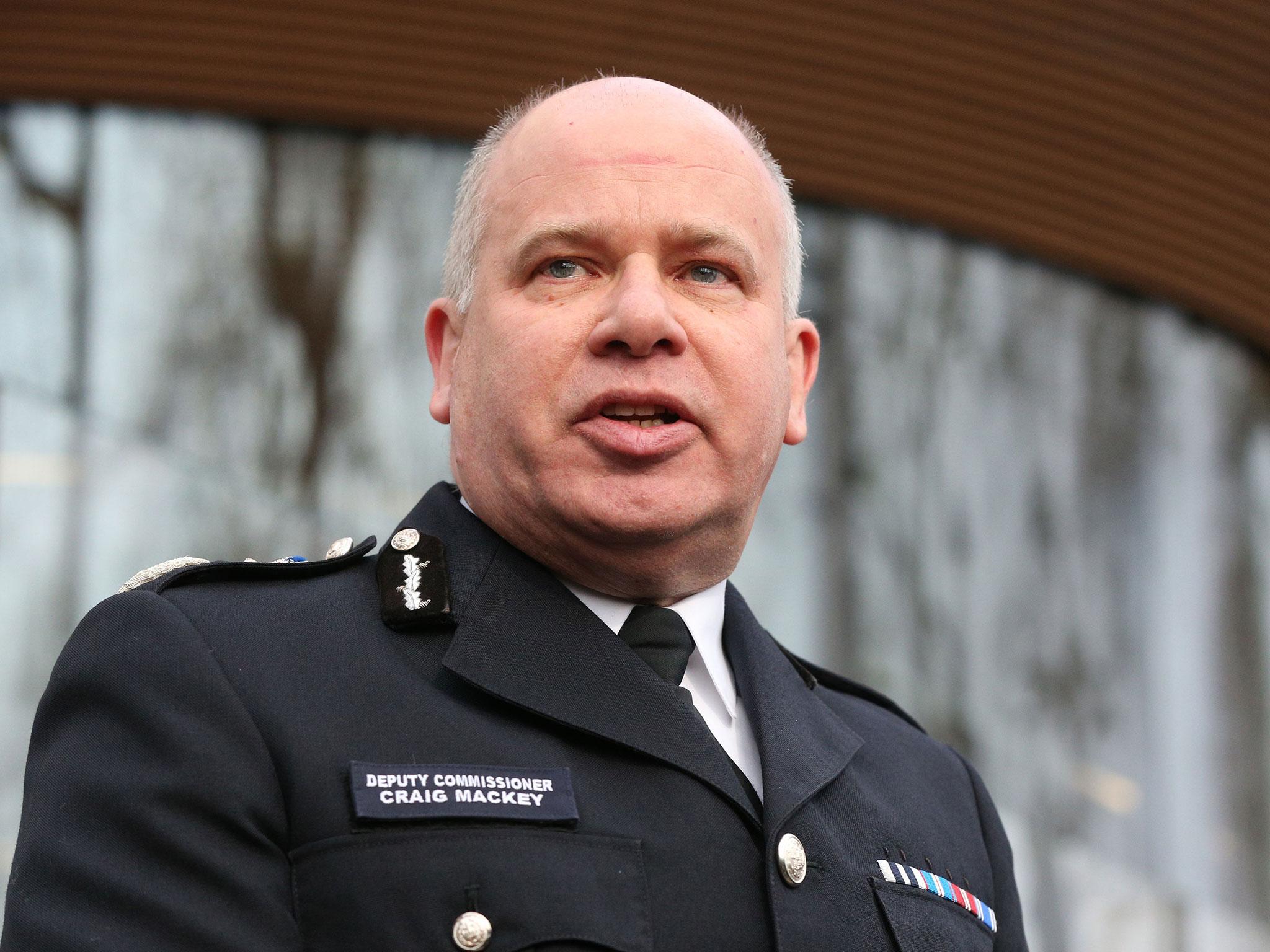Met Police chief who locked himself in car during Westminster attack acted 'properly', coroner says
Commissioner hits out at 'confused, unpleasant, personalised and ignorant commentary' on Sir Craig Mackey's actions
The actions of a police chief who locked himself in a car during the Westminster attack were “sensible and proper”, a coroner has said.
Mark Lucraft QC, the chief coroner of England and Wales, said Khalid Masood had “already stabbed PC Keith Palmer” by the time Sir Craig Mackey saw him.
“There was clearly nothing which Sir Craig could have done to stop Masood from attacking the officer,” he added.
“What Sir Craig did was sensible and proper, and was intended to protect others in the car with him.
“None of them had any means of protecting themselves or of resisting an attack, and even if he had got out of the car, it is clear from CCTV evidence that he would not have reached PC Palmer before Masood had inflicted the fatal wound.”
Sir Craig, who was then acting Commissioner of the Metropolitan Police, was leaving a meeting at the Houses of Parliament when the attack unfolded on 22 March 2017.
Earlier this week he told the Old Bailey he had no radio or protective equipment, and locked the car for safety amid “confusion” about what was happening.
Some police officers and commentators accused Sir Craig of “cowardice” after he gave evidence to the inquest, calling for his knighthood and Queen’s Police Medal to be stripped.

He was contrasted with PC Palmer and other police officers seriously injured by terrorists during the London Bridge attack, who were honoured on Thursday.
Metropolitan Police Commissioner Cressida Dick condemned what she called “confused, unpleasant, personalised and ignorant commentary” over Sir Craig’s actions.
“These criticisms are simply not supported by the evidence,” she added. “Sir Craig had absolutely no opportunity to stop the killer or save PC Palmer. Anyone who suggests otherwise is simply wrong.
“The actions he was able to and did take were to protect the unarmed police staff colleagues who were in the car with him. He went on to lead the Met’s response to the attack with distinction.”
Assistant Commissioner Neil Basu, the head of UK national counterterror policing, also hit out at “abhorrent remarks”.
Having overseen the Westminster attack investigation himself, Mr Basu said that if Sir Craig had left the car it would have put him “in the line of fire and prevented the protection officer from taking the shot, which stopped the terrorist once and for all”.
“Everyone involved in the terrible events that day has been left living with the painful legacy of one man’s murderous actions,” he added.
“We must all remember who was responsible for this attack – a terrorist – and not give such people the comfort that they have somehow divided us as a result of their actions.”
From the car’s passenger seat Sir Craig described seeing Masood inflict “two determined stab wounds”, adding: “I could see PC Palmer moving backwards and him going down.”
Sir Craig, who is to retire in December, said the two other people in the car were not police officers and “if anyone had got out, the way Masood was looking, anyone who got in his way would have been a target”.
He heard Masood being shot seconds later and “went to open the door to get out” but was told by a constable to shut the door again and leave.
Sir Craig was then driven away and started coordinating the response to the attack, which was initially feared to involve multiple terrorists.
“Sir Craig did not flee the scene,” Judge Lucraft told the jury. “He was told by an officer to leave, and for good reason.
“You may well think that it was important for the most senior police officer in the country to be at New Scotland Yard where he could take command and control of what, at that time, could potentially have been part of a much larger attack.”
The coroner added that if Sir Craig’s car had not been approaching Carriage Gates when Masood entered it, a vehicle barrier would have been up and more officers would have been “trapped”.
The inquest heard dramatic accounts of how unarmed police officers and members of the public fled after Masood continued to advance with two large knives after fatally wounding PC Palmer.
A close protection officer who had been waiting for a minister nearby recounted shouting the 52-year-old three times after he refused to drop his weapons and came towards him.
“He was carrying two large knives and I could clearly see that they were covered in blood,” he said. “He was going to kill me.”
Judge Lucraft directed the jury that the only conclusion they can reach was that Masood was “lawfully killed”, saying the officer who shot him “honestly believed it was necessary” in defence of himself and others.
The jury also gave a concise narrative on how Masood met his death.
He was handcuffed and given first aid, before being transported to hospital where he was declared dead.
PC Palmer died at the scene after undergoing emergency surgery and first-aid from paramedics and bystanders, including defence minister Tobias Ellwood.
Masood also killed four other victims with his car on Westminster Bridge – American tourist Kurt Cochran, 54, retired window cleaner Leslie Rhodes, 75, Aysha Frade, 44, and Romanian tourist Andreea Cristea, 31 – and seriously injured 29 other people .
A separate inquest into their deaths found they were unlawfully killed, and that “security shortcomings” in the way Scotland Yard positioned its armed officers may have contributed to PC Palmer’s death.

